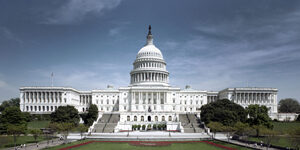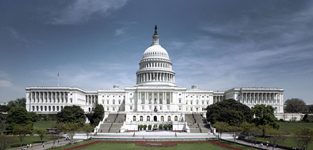Jessica McMahon, Maeve Montesi, Sara Downie
As three University of Delaware Medical Laboratory Sciences students, we had no idea what to expect at our first ASCLS Legislative Symposium in Washington, D.C. We were unfamiliar with what lobbying was, how it was done, or the extreme importance of the issues for which we were lobbying. Although well versed in the sciences of the career, we were not familiar with the political issues surrounding it. Essentially, we arrived at the hotel the day before the Legislative Symposium, often referred to as ‘Leg Day,’ with no idea what to expect or how much we would learn.
To our surprise, medical laboratory scientists (MLS) came to Leg Day from forty-three states! It was amazing to see professionals come together to discuss the impact of these issues on not only everyone in the room, but other communities outside of our own. There was a large sense of unity among the members, especially those who had previously attended the ASCLS Legislative Symposium. With a good mixture of new and returning participants, everyone could add to the conversation, allowing for a dialogue about the various legislations.
The presentations on Monday opened our eyes to many issues with which we were unfamiliar, the Protection of Access to Medicare Act (PAMA) bill being the most pressing and concerning. ASCLS Executive Vice President, Jim Flanigan, opened the day with several jokes and set the stage for a day of sitting, learning, and conversation between professionals.
We greatly appreciated Patrick Cooney, Matt McMarty, and Matt Schultz’s quick introductory lesson on the U.S. government and how things run at the Capitol, senate, and congressional buildings, more commonly referred to as “The Hill.” As science students, we definitely needed the political background.
The panel conversations that constituted the remainder of the day were incredibly helpful. The panelists were well spoken and insightful. Specifically, Julie Allen, from National Independent Laboratory Association, did an excellent job of explaining the complicated issue of PAMA in terms we could understand and to which we could relate. She was able to explain the potential far-reaching impacts of the bill and used phrasing that we could reiterate to our congressional members. As newcomers to the conference, we greatly appreciated having some scripted verbiage.
The workforce discussion and panel were also particularly informative and relatable for us. Finding clinical rotation laboratories for University of Delaware students with experienced professionals and the capacity to take them is becoming increasingly difficult. We appreciated the presentations and research done on the topic and were able to use some of the statistics and research from the panel to substantiate and personalize our presentations to the Delaware senators and congresswoman. In addition, Jim Flanigan did a wonderful job organizing the presentations and guiding our questions throughout the long day. After the Monday lectures, we felt more than comfortable explaining the issues to our government’s congressional members.
Overall, Leg Day offered incredible insight into many issues unbeknownst to us. During our quick lunch break, we were fortunate to sit with returning Leg Day participants. We learned best and worst ways to approach congressional members. The best part about Leg Day was talking to the other laboratory scientists and hearing their views and how these issues have impacted them. It is incredible that several students who, before March 20th, had no knowledge of these issues could relate and sympathize with laboratory scientists who had worked in the field for years.
We were very lucky, thanks to Dr. Mary Ann McLane, to have appointments at the offices of Delaware’s two senators, Chris Coons and Tom Carper, and Delaware’s congresswoman, Lisa Blunt Rochester. In all three appointments, we had the privilege of talking to the healthcare staff member for fifteen to twenty minutes. We were never rushed or pushed out of the office.
We actually got a photo with Senator Carper! For the most part, we felt that the staff members did an excellent job of listening and understanding our cause and taking note of our issues. We felt incredibly prepared after Leg Day and could talk professionally and cordially about PAMA, the MLS workforce and laboratory developed tests while expressing the urgency of the topics. Being on “The Hill” in Washington, D.C. was an incredible experience and an amazing opportunity. We highly recommend that any professor in medical laboratory sciences bring as many students to Leg Day as possible! It showcases a side of the profession that cannot be taught in the classroom and provides a whole other realm of appreciation for not only the profession but the individuals who work so hard in it.
As future medical lab scientists, Leg Day and lobbying offered us the chance to problem solve outside of the lab. It enabled us to get involved with our future and work to help steer it in the right direction. We hope to see everyone again next year!
We gratefully acknowledge the funding support of the University of Delaware Honors Program, the university crowdfunding effort, and the Department of Medical Laboratory Sciences. It truly would not have been possible without their help.

